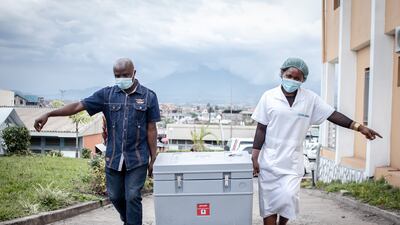The worst effects of the coronavirus pandemic on global health and economies were averted thanks to unprecedented levels of cross-border collaboration and innovation, the Bill and Melinda Gates Foundation’s fifth annual Goalkeepers Report has said.
The report provides the latest global data set for how the pandemic is affecting progress towards the United Nations’ Sustainable Development Goals.
Similarly to last year’s report, data for 2021 showed that, on nearly every indicator – from extreme poverty to gender parity and universal education – the world had regressed.
But the development of a vaccine along with global efforts to step up innovation and collaboration resulted in better-than-expected figures.
Last year’s projection that an additional 37 million people would be pushed into poverty because of Covid-19 was adjusted to the slightly lower – albeit no less grim – figure of 31 million, including 1.5 million across the Middle East and North Africa region, in 2021.

The philanthropic group previously anticipated a 14 per cent drop in global vaccine coverage, which it said would have wiped out 25 years of progress, but was “pleasantly surprised” by latest data that showed a drop of only half the projected figure.
Accelerated catch-up campaigns and technology helped to avert some of the worst-case scenarios, including the World Health Organisation’s forecast in 2020 of an additional 200,000 deaths from malaria.
In Benin a digitised distribution system for insecticide-treated bed nets saw 7.6 million of the products sent to homes across the west African country in only 20 days.
“The most optimistic part of the report is how much innovation has contributed in the middle of a crisis to helping address these kinds of issues,” said chief executive Mark Suzman at an online session to discuss the foundation’s findings.
Worldwide collaboration on inoculation against the virus was by far the biggest contributor to reducing the worst effects of the pandemic.
“It is completely unprecedented to have a single vaccine, let alone multiple successful vaccines, get through your development, clinical trial testing, regulatory approval and into human arms,” he said.

Mr Suzman credited the rapid and successful development of Covid-19 vaccines to decades of prior investment in research and development, including in the breakthrough mRNA technology used in the Pfizer-BioNTech and Moderna vaccines.
Years of spending on a genomic surveillance network in Africa was, he says, the reason the world knew that the more infectious and deadly beta variant had emerged in South Africa, allowing for a faster and more effective global response.
“It's that kind of global co-operation, collaboration and data, making sure that it exists globally that we think there are positive examples that we can learn from and put in place,” Mr Suzman said.
But he warned of the dangers of complacency and urged world leaders to provide heavier investment.
“We got very lucky with the vaccine this time but we might need more focused treatments [later], we need rapid diagnostic tests that are widely available, we need bigger investment in research and development more broadly … particularly in parts of the world that don't currently have vaccine manufacturing capacity. All of these are very possible and cheap … relative to the cost that we've seen Covid has already caused,” he said.
Global vaccine inequity remains a barrier to progress. Despite 60 per cent of the world’s vaccines being produced in India, less than 1 per cent of all Covid-19 vaccines have been administered in low-income countries. The report warned against Covid-19 becoming “another pandemic of poverty” and urged greater investment in infrastructure to manufacture vaccines locally.

“How foolish will the world look if a new variant is developed that is much more resistant to current vaccines because we didn't go ahead and provide the requisite global vaccination needed now?” Mr Guzman said.
Advances in digital technology have also helped claw back some of the losses in education and Mr Suzman said the foundation was looking at investing in certain platforms that might accelerate access to educational tools in low-resource settings.
Economic damage and recovery from Covid-19 was reinforcing inequality, the report said. Rates for men’s employment this year are expected to recover to pre-pandemic levels whereas women’s are expected to remain at about 13 million jobs below the 2019 level.
The disparity extends beyond gender. By next year, 90 per cent of advanced economics are expected to regain pre-pandemic per capita income levels, compared to only one third of low and middle-income economies. Mr Guzman said the report was an “urgent call” to high-income countries to focus on the “global over the crisis.”
“If and when a new pandemic breaks out, if we don't have in place the surveillance systems, the better global structures, the broader research and development, the international collaboration, the funding, then we're likely to have consequences similar or far more deadly to the ones we've been seeing now.”


